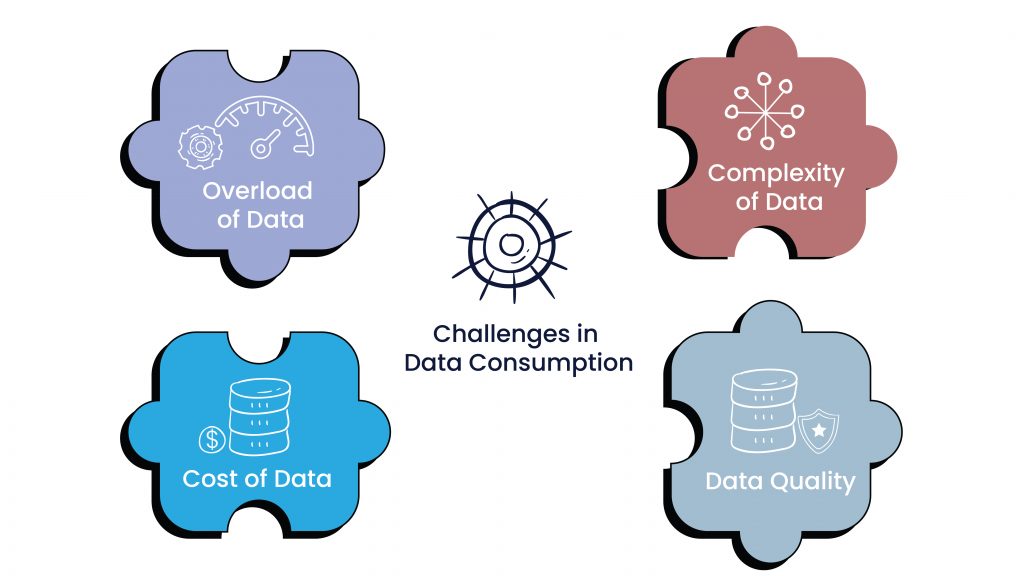Data has grown in importance as a commercial asset, with many companies investing considerably in data collection and transformation. Nevertheless, data collection is not the biggest challenge; what businesses do with it is. In the age of big data, another crucial difficulty is guaranteeing quality.
Moreover, firms frequently face data management difficulties such as inefficient data processing, transformation, and analysis. According to a survey by Capital One, 82% businesses reported difficulties in integrating their data for analysis, while 79% reported lack of tracking and adherence to governance policies. Overcoming these obstacles might result in tremendous advantages. Some businesses have better understood their clients’ wants and preferences by harnessing data insights and tailoring their offers appropriately.
Netflix is one such organization. Netflix is a great example of effective data consumption, using quantitative data to make personalized show recommendations for its millions of subscribers. This data analysis has helped Netflix retain 93% of its customers and ensures 80% of its content is streamed. This highlights the importance of data consumption for organizations of all sizes to maintain longevity.
The Importance of Data Consumption
Data is important in decision-making processes because it enables firms to make educated decisions that promote development and success. Amazon’s recommendation engine, for example, is powered by machine learning algorithms that evaluate user behavior and preferences.
As a result, consumer engagement and retention have increased significantly, with tailored suggestions accounting for up to 35% of Amazon’s sales. This has boosted customer loyalty and retention by employing data insights to customize its products, with a 15% rise in customer retention rates.
Data is critical in providing tangible value to the company. According to Bain & Company, businesses that utilize data to drive decision-making may increase their marketing return on investment (ROI) by 15-20%. Moreover, data-driven businesses may enhance operational efficiency by 10-20%, resulting in considerable cost savings.
Data consumption is crucial for organizations to get the full value of data. Businesses may make educated decisions that promote development and success by properly consuming and utilizing data, giving demonstrable value to the organization.
Challenges in Data Consumption

Overload of Data
Due to data overload and complexity, organizations have considerable challenges in consuming and exploiting data. With so much data accessible, it may be tough to make sense of it all and extract meaningful insights.
Complexity of Data
Another significant issue in data consumption is the scarcity of meaningful and actionable insights. Data is accumulated from varied systems throughout the organization in multiple formats and types that makes it difficult to integrate and channelize. To make sense of accumulated data requires skilled resources and can be challenging for someone without the technical knowhow.
Data Quality
Having high quality and reliable data is essential to promote efficient and reliable analysis. Organizations often struggle to generate quality insights from data if there are no built processes around data validation, data standardization, and data profiling. Some of the major challenges that impact data quality are outdated data, duplicate data, inconsistent and incomplete data.
Cost of Data
Obtaining actionable and quality insights from data is not the only pain-point of major organizations. Most of the organizations also struggle with rising costs of data storage, data analysis and data transformation. In most cases, building large machine learning models eat up the majority of organizational resources without showing significant ROI.
Solving Challenges in Data Consumption
Organizations may address data consumption difficulties by using data visualization tools to simplify data presentation. Also, adopting a data-driven culture, enhancing data literacy, and embracing automation can help organizations move forward towards building efficient processes around data utilization.
Data-Driven Culture and Data Literacy
Establishing a data-driven culture and increasing data literacy is also important for efficient data consumption. Businesses should guarantee that their staff understands the importance of data and how it can be utilized to drive decision-making by fostering a data-driven culture.
Furthermore, investing in training programs and tools to increase data literacy ensures that staff can consume and apply data properly.
Automation, AI, and Data Products
Data products are solutions that deliver deep insights based on advanced analytics and machine learning to help business leaders make better decisions. Data products may assist organizations in overcoming data consumption difficulties and realizing the full potential of data by providing consumers with relevant and actionable information.
Developing data products can aid in data consumption by offering consumers relevant and actionable information suited to their needs. Data products may help businesses overcome data consumption difficulties by improving data administration and making data more accessible and easy to consume.
One advantage of data products is that they assist firms in making educated decisions swiftly and efficiently. According to McKinsey, data-driven businesses that employ data products may make choices up to 30% faster than competitors. Data products also boost decision-making accuracy; data-driven organizations can improve decision-making accuracy by up to 15%.
Data products may take many forms, from dashboards displaying important performance indicators to machine learning models making automated predictions. Google’s search algorithm is an example of a successful data product. The system uses massive volumes of data to deliver appropriate search results to users depending on their searches. Similarly, Amazon’s recommendation engine is a data product that recommends products to consumers based on likes and activity.
One of the most significant advantages of data products is their capacity to handle specific data consumption difficulties. As mentioned above, companies may overcome these hurdles and acquire useful insights to support their decision-making by developing data solutions that deliver data in easy visual representations and insights tailored to the specific demands of a business.
Data products are a strong tool for enterprises looking to maximize the value of their data assets. They provide several benefits, including greater decision-making precision, efficiency, and the establishment of new income sources.
A platform like Enrich is a powerful tool to help organizations build data products quickly and efficiently.
One of the major benefits of Enrich is its ability to create mass-customized data products that cater to specific business needs. By leveraging Enrich’s workflows, like anomaly detection, organizations can solve various data consumption challenges, such as detecting fraudulent transactions, improving conversion rates, and customer profiling. Learn more about how you can solve data consumption problems at your organization with Enrich.



